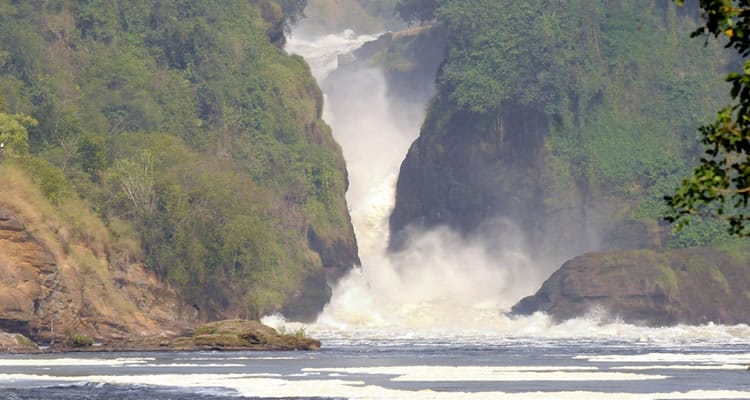Uganda is a landlocked country bordered by Kenya in the east, Sudan in the north, Democratic Republic of the Congo in the west, Rwanda in the southwest and Tanzania in the south. Uganda’s total land area is 241,559 sq km. About 37,000 sq km of this area is occupied by open water while the rest is land. The southern part of the country includes a substantial portion of Lake Victoria, which it shares with Kenya and Tanzania. Uganda is located on the East African plateau, averaging about 1,100 meters (3,609 ft) above sea level. The plateau generally slopes downwards towards Sudan explaining the northerly tendency of most river flows in the country. Although generally equatorial, the climate is not uniform since the altitude modifies the climate. Uganda’s elevation, soil types and predominantly warm and wet climate impart a huge agricultural potential to the country. They also explain the country’s large variety of forests, grasslands and wildlife reserves. Uganda has a total population of about 32 million people.
Geography and Climate
Uganda’s weather conditions are ideal, ranging from the warmth of the lowland areas to the coolness of the highlands in the South West Kigezi. For most of the year, Uganda is sunny with temperatures rarely rising above 29 degrees. The average temperature is about 26 degrees C, with a maximum of 18-31 degrees and minimum of 15-23 degrees depending on the part of the country. The rain season is March-May. Light rain season is November and December. Wet seasons are March –May and October-November; dry seasons are December to February and June to August. Rainfall ranges between 500mm to 2500 mm and the relative humidity is 70 – 100%. The rainfall regime allows two planting and harvesting seasons a year in most parts of the country, without the use of irrigation. About 34% of the country is covered in wetlands with a dense network of rivers, lakes and swamps. Generally, the country is endowed with fertile soils. Uganda has some of the largest lakes on the continent including Lake Albert and Lake Victoria
Culture Heritage and Language
Uganda is a country rich in cultural heritage since people from various origins inhabit the place from time immemorial. Many of the regions like Buganda, Bunyoro and Toro had kingdoms. The people are quite hospitable. Each of the tribe is very respect to their tradition. Uganda culture is a melting pot of diverse cultural practices.
Uganda Culture includes a number of religious groups like Christians, Sikhs; Hindus etc. people speak in 40 languages out of which Luganda is the most common one. Swahili is also used. English is the official language. Literature of Uganda is very rich as well. Culture in Uganda is farther enriched by various sports like football and cricket.
Uganda Music is an integrated part of the Culture of Uganda. Each of the tribe has their own song and dances for most of the occasions. Kitaguriro is a form of dance of the bayankole, while the banyoro perform Runyege dance, Acholi also has traditional dances such as Bwila and Otole, Agwal is the traditional dance of the Alur people and the Bagisu people have their Imbalu dance during the circumcision ceremonies. The commonly played instruments are Ennaga, Amadinda, Ndigindi, Entongoli and Likeme.
English is the official language in Uganda and most Ugandans are generally fluent when it comes to speaking English. Although the country has over 36 different tribes who speak different dialects, Luganda serves as something of a lingua franca. We also have a number of people who speak French due to the strong influence from Congo and Rwanda, not to mention the influence of Alliance Francias, a French language teaching school in the city.
Health
Uganda is generally a safe country. One is required to have a certificate of yellow fever vaccination. All visitors to Uganda should take anti-malaria drugs as a precaution against this prevalent disease. It is also advisable to drink bottled which are readily available in any of the many supermarkets, restaurants and shops rather than tap water. The AIDS scourge which afflicted the nation has dramatically dropped due to a strong AIDS sensitization campaign by the government and NGOs but one is advised to take precaution.
Economy and Currency
Since assuming power in early 1986, Museveni’s government has taken important steps toward economic rehabilitation and adopted policies that have promoted rapid economic development. Uganda suffered political turmoil and devastating economic drawbacks between 1971 and 1986. This extended period of regression left Uganda as one of the world’s poorest countries. Under Museveni’s leadership the country initiated a broad range of economic reforms including the notable liberalisation of market prices and privatisation of public enterprises. These reforms have improved economic performance and sustained economic growth at an average of 7% per annum for the last ten years.
The unit of currency is the Uganda shilling. Most tour operators prefer that tourist pay in US dollars, but Euros and Pound Sterling are also widely accepted. Hard currency cash can be changed for the local currency at any of the banks and forex bureaus in all the towns within Uganda, although one will find difficulty using travelers’ cheques outside of Kampala. You can draw the Ugandan Shilling against Visa and other major credit cards at selected bank ATMs in Kampala, Entebbe International Airport, as well as in other larger towns outside of the Capital.

